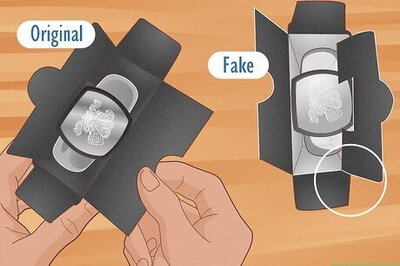
views
If a good-looking, well-dressed gentleman knocks on your door asking for help, would you turn him down?
If you answer, "No," you could be the perfect victim for a burglary. Why? Because you made a snap judgment on the basis of appearance.
India has over 11.5 lakh (1.15 million) licensed insurance agents today, and many more who are practicing illegally.
They look perfectly respectable. How do you make sure the agent sitting across you is genuine or someone trying to make money off your ignorance?
Some pointers for you:
Check for ID
Krishna Tripathi has an alarming tale to tell. An insurance agent knocked on his door to sell him a policy. A cautious man, Tripathi asked the agent for an identity card. The agent produced his wife's identity card!
You need to know this: All insurance agents are licensed by the Insurance Regulatory And Development Authority, and must undergo rigorous training before they can clear their certification examination.
The training equips them to advise people on their life insurance needs. A person without a license may not be fully capable of giving sound financial advice.
What you can do: Check if your agent has his/her IRDA-issued identity card. Verify that the card does, indeed, belong to the person sitting in front of you.
You need to know this: The right way to select an insurance policy is not by going for the lowest premium.
PAGE_BREAK
Your decision must be based on a combination of growth and expenses.
What you can do: Ask to see a benefit or sales illustration. Ask for details such as growth, expenses and surrender value.
According to the rules, an agent can show you maturity values based on two rates: six per cent per annum and 10 per cent per annum. Your agent may show you lower, never higher, returns.
More important, these are not guaranteed, only indicative, returns. These vary with prevailing economic conditions. If your agent is promising a guarantee, ask him to give this in writing.
That should make him rethink his offer.
With the introduction of unit linked policies in the market, charges and expenses are critical to buying life insurance. You must have a clear idea about the charges on your policy and their impact on your final fund value.
Say Company X charges 20 per cent premium in the first year and four per cent thereafter. Company Y charges 30 per cent in the first year and one per cent thereafter.
You will have an idea of the more expensive one only if you have an illustration for both, assuming similar rates of return.
Ask the agents of both companies to give you the fund value on maturity assuming a rate of return of 6 per cent. The company that gives you a higher fund value is, obviously, the better choice.
Check after sales service
You need to know: Insurance does not end with purchase. In fact, that is when it starts.
A private life insurance company found out recently that policies lapsed mainly because of the lack of adequate agent servicing. In fact, most people had just forgotten to pay their premiums – their agent had not followed up with them – and were not even aware their policies had lapsed.
PAGE_BREAK
What you can do:
- Get all relevant contact details of the company.
- Ask the agent who will service you in the future, or in his absence. After all, you will need his services when you make a claim, as will your nominees.
- Check if your agent will help you monitor your policy's performance, especially Unit Linked Insurance Plans, since you will need to switch to get maximum benefit.
Check commission structures
You need to know: Agents work on commission, typically, a percentage of the premium you need to pay. Not surprisingly, some agents may try to sell you high premium products you don't even need. There is an upper ceiling on the commissions payable, which is regulated by the IRDA. This varies from product to product.
What you can do: You could ask your agent to tell you the maximum commission he will get on the sale of a particular policy. This tells you whether there are any vested interests of the agent in selling the policy.
Check policy exclusions
You need to know: Don't ignore the fine print. All policies tell you incidents/ situations they will not cover, usually in fine print. Financial consultant PV Subramanyam says, "It is very important that you know these.
What you can do: Ask your agent to give you details of all exclusions in your chosen policy, especially those related to suppression of material facts and suicide – these will matter when you make that claim."
Insurance is too big a decision to make without preliminary checks.
These five simple checks should ensure that the smartly dressed person sitting in front of you is not some fly-by-night operator.
Disclaimer: While we have made efforts to ensure the accuracy of our content (consisting of articles and information), neither this website nor the author shall be held responsible for any losses/ incidents suffered by people accessing, using or is supplied with the content.



















Comments
0 comment